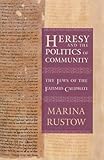Heresy and the Politics of Community : the Jews of the Fatimid Caliphate / Marina Rustow.
Material type: TextSeries: Publication details: Ithaca, N.Y. : Cornell University Press, (c)2014.Description: 1 online resourceContent type:
TextSeries: Publication details: Ithaca, N.Y. : Cornell University Press, (c)2014.Description: 1 online resourceContent type: - text
- computer
- online resource
- 9780801455308
- BM185 .H474 2014
- COPYRIGHT NOT covered - Click this link to request copyright permission: https://lib.ciu.edu/copyright-request-form
| Item type | Current library | Collection | Call number | URL | Status | Date due | Barcode | |
|---|---|---|---|---|---|---|---|---|
 Online Book (LOGIN USING YOUR MY CIU LOGIN AND PASSWORD)
Online Book (LOGIN USING YOUR MY CIU LOGIN AND PASSWORD)
|
G. Allen Fleece Library ONLINE | Non-fiction | BM185 (Browse shelf(Opens below)) | Link to resource | Available | ocn979969958 |
Includes bibliographies and index.
Frontmatter -- Contents -- List of Illustrations and Maps -- Acknowledgments -- Note on Transliteration, Transcription, and Citations -- Introduction -- Abbreviations -- Part I: The Shape of the Jewish Community -- 1. The Tripartite Community -- 2. Jewish Book Culture in the Tenth Century -- 3. The Limits of Communal Autonomy -- Part II: Rabbanites, Qaraites, and the Politics of Leadership -- 4. Qaraites and the Politics of Powerlessness -- 5. "Nothing but Kindness, Benefit, and Loyalty": Qaraites and the Ge'onim of Baghdad -- 6. "Under the Authority of God and All Israel": Qaraites and the Ge'onim of Jerusalem -- 7. "Glory of the Two Parties": Petitions to Qaraite Courtiers -- 8. The Affair of the Ban of Excommunication in 1029 -- Part III: Scholastic Loyalty and Its Limits -- 9. Rabbanite-Qaraite Marriages -- 10. In the Courts: Legal Reciprocity -- Part IV: The Origins of Territorial Governance -- 11. Avignon in Ramla: The Schism of 1038-42 -- 12. The Tripartite Community and the First Crusade -- Epilogue: Toward a History of Jewish Heresy -- Glossary -- Guide to Places and People -- Manuscript Sources -- Bibliography -- Index.
In a book with a bold new view of medieval Jewish history, written in a style accessible to nonspecialists and students as well as to scholars in the field, Marina Rustow changes our understanding of the origins and nature of heresy itself. Scholars have long believed that the Rabbanites and Qaraites, the two major Jewish groups under Islamic rule, split decisively in the tenth century and from that time forward the minority Qaraites were deemed a heretical sect. Qaraites affirmed a right to decide matters of Jewish law free from centuries of rabbinic interpretation; the Rabbanites, in turn, claimed an unbroken chain of scholarly tradition. Rustow draws heavily on the Cairo Geniza, a repository of papers found in a Rabbanite synagogue, to show that despite the often fierce arguments between the groups, they depended on each other for political and financial support and cooperated in both public and private life. This evidence of remarkable interchange leads Rustow to the conclusion that the accusation of heresy appeared sporadically, in specific contexts, and that the history of permanent schism was the invention of polemicists on both sides. Power shifted back and forth fluidly across what later commentators, particularly those invested in the rabbinic claim to exclusive authority, deemed to have been sharply drawn boundaries. Heresy and the Politics of Community paints a portrait of a more flexible medieval Eastern Mediterranean world than has previously been imagined and demonstrates a new understanding of the historical meanings of charges of heresy against communities of faith. Historians of premodern societies will find that, in her fresh approach to medieval Jewish and Islamic culture, Rustow illuminates a major issue in the history of religions.
COPYRIGHT NOT covered - Click this link to request copyright permission:
There are no comments on this title.
